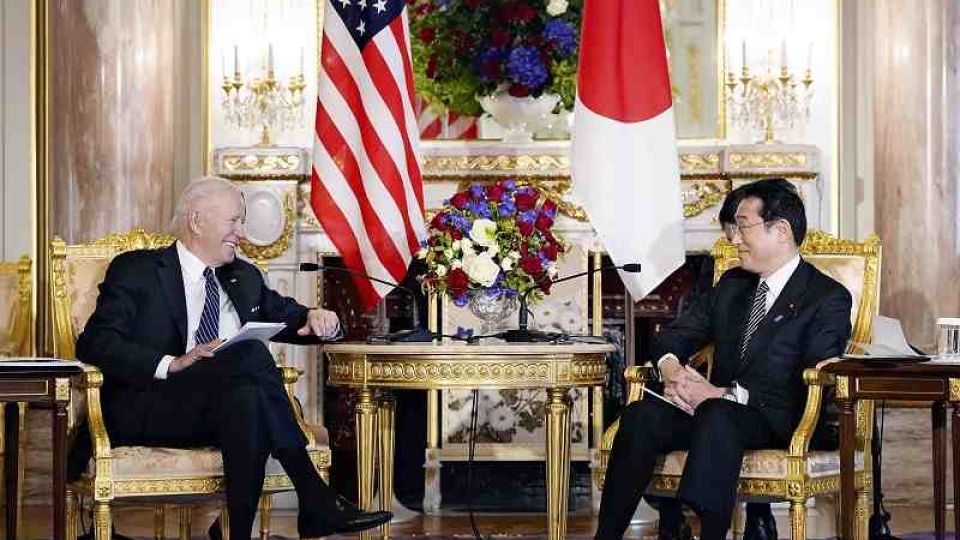May 24, 2022
TOKYO – Prime Minister Fumio Kishida and U.S. President Joe Biden agreed Monday to strengthen the deterrence and response capabilities of the Japan-U.S. alliance, in light of Russia’s invasion of Ukraine and China’s increasingly hegemonic behavior in the East China Sea and South China Sea.
During their meeting at the State Guest House in the Moto-Akasaka district of Tokyo, Kishida also welcomed the creation of the Indo-Pacific Economic Framework (IPEF), a new economic initiative led by Biden, and expressed Japan’s intention to participate in it.
This was the first official in-person meeting between Kishida and Biden.
“Russia’s aggression against Ukraine has undermined the foundations of the international order. Attempts to unilaterally change the status quo by force are absolutely unacceptable wherever we are in the world,” Kishida said at the talks.
“That is exactly why during this time, Japan and the United States — two nations that share fundamental values — will strongly lead the international community to realize a free and open Indo-Pacific based on the rule of law,” the prime minister said.
Biden responded, “The U.S.-Japan alliance has long been the cornerstone of peace and prosperity in the Indo-Pacific, and the United States remains fully committed to Japan’s defense, and we will face challenges today and in the future together.”
During the talks, Kishida expressed his determination to drastically reinforce Japan’s defense capabilities. He also stated Tokyo’s intention to increase Japan’s defense spending, which only accounts for about 1% of its gross domestic product.
At a joint press conference with Biden later the same day, Kishida said the two countries would communicate more closely to ensure the United States’ extended deterrence for Japan.
The two leaders also affirmed that Tokyo and Washington will work together to realize a world without nuclear weapons, a goal that has been advocated by Kishida. The prime minister’s political home turf is Hiroshima Prefecture, where the United States dropped an atomic bomb at the end of World War II.
During their meeting, Kishida told Biden that Japan plans to host the Group of Seven summit in Hiroshima next year. The choice of city is apparently aimed at building momentum toward the abolition of nuclear weapons.
On regional issues, the two leaders confirmed their stance to expand sanctions against Russia and continue support for Ukraine. They also expressed concern over issues related to the East China Sea and the South China Sea and shared the view that peace and stability in the Taiwan Strait are important.
They agreed to urge North Korea to stop its nuclear and missile development programs as well as cooperate in solving the issue of Japanese nationals abducted by Pyongyang.
Regarding U.N. reform, Kishida and Biden affirmed the need to reform the United Nations. Kishida said at the press conference that Biden supported Japan becoming a permanent member of the U.N. Security Council if reform is realized.
Kishida and Biden also agreed to strengthen cooperation in economic security by taking steps such as the construction of a supply chain for semiconductors and the development of artificial intelligence and other advanced technologies.
The two leaders agreed to hold two-plus-two talks on economic issues in July.
The talks began with a one-on-one meeting shortly after 11 a.m. on Monday, which was followed by a luncheon meeting. Kishida was to host a dinner for Biden at the Happo-en garden in Minato Ward, Tokyo, on the same day.

